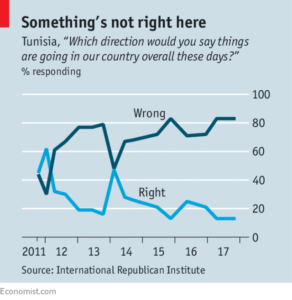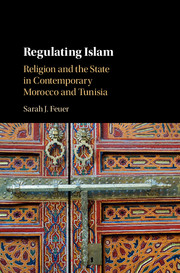 Some view Tunisia’s recent demonstrations and the government’s response as a dire warning that the end of the country’s experiment with democracy is near, notes Safwan Masri, the author of ‘Tunisia: An Arab Anomaly’ Others ask whether the country’s civic achievements, recognised as both an anomaly among and a source of inspiration for other Arab nations, need to be reconsidered. Both views are overly despairing. They fail to properly account for the source of the current round of unrest, the opportunities for overcoming it, and the stark differences in the two political moments, he writes for The Financial Times:
Some view Tunisia’s recent demonstrations and the government’s response as a dire warning that the end of the country’s experiment with democracy is near, notes Safwan Masri, the author of ‘Tunisia: An Arab Anomaly’ Others ask whether the country’s civic achievements, recognised as both an anomaly among and a source of inspiration for other Arab nations, need to be reconsidered. Both views are overly despairing. They fail to properly account for the source of the current round of unrest, the opportunities for overcoming it, and the stark differences in the two political moments, he writes for The Financial Times:
Since the revolution, Tunisians have achieved electoral democracy, witnessed multiple peaceful transitions of power, adopted a secular constitution, embraced further advances in the rights of women and established freedoms of expression and the press. If these civic assets, unique in the Arab world, can be harnessed, they may well prove Tunisia’s salvation. Tunisia needs to accomplish on the economic front what it has done for the advancement of the democratic rights of its citizens. The spirit of compromise, debate, and consensus-building that has brought the country so far could save this sole success story in an otherwise devastated region.
But the continued poor performance of the Tunisian economy and the popular discontent might undermine grassroots trust in democracy across the region, analysts Abdullah Aydogan and A.Kadir Yildirim write for Carnegie’s Sada Journal.
 A recent International Republican Institute* poll (right) that highlighted citizens’ preoccupation with the country’s economic travails also revealed a growing approval of the Chahed government’s performance in recent months, most likely in response to its anti-corruption agenda—which some civil society organizations have deemed inadequate to the task, notes Sarah Feuer, a Soref Fellow at The Washington Institute and the author of Regulating Islam: Religion and the State in Contemporary Morocco and Tunisia (Cambridge University Press).
A recent International Republican Institute* poll (right) that highlighted citizens’ preoccupation with the country’s economic travails also revealed a growing approval of the Chahed government’s performance in recent months, most likely in response to its anti-corruption agenda—which some civil society organizations have deemed inadequate to the task, notes Sarah Feuer, a Soref Fellow at The Washington Institute and the author of Regulating Islam: Religion and the State in Contemporary Morocco and Tunisia (Cambridge University Press).
For U.S. policymakers, the latest round of unrest serves as a reminder that Tunisia’s relative success in an otherwise turbulent region remains tenuous and vulnerable to collapse without continued attention. Moreover, the Trump administration should consider three measures to help Tunisia emerge from the current period intact: one economic, one security related, and one political, she writes:
- To date, the United States has guaranteed $1 billion in loans to Tunisia, facilitating much-needed access to international capital markets. In October 2017, Tunisian officials indicated they plan to request an additional loan guarantee in the amount of $500 million. Previous agreements vaguely stipulated that the Tunisian government would direct funds to economic development. This time, Washington should approve the request but tie the guarantee to more explicit and detailed pledges from Tunisian lawmakers that they will invest the funds in infrastructure and small business development in the country’s neglected interior regions.
 A key component of U.S. security assistance to Tunisia has come in the form of police training. The initial returns on this investment were apparent in 2016, when a similar outbreak was met with police restraint—widely seen as a product of U.S. (and French) training and credited with preventing the protests from spiraling out of control. To the extent the reactions of law enforcement affect the trajectory of social upheavals, continued training of the police—especially units serving in the country’s interior—will be crucial.
A key component of U.S. security assistance to Tunisia has come in the form of police training. The initial returns on this investment were apparent in 2016, when a similar outbreak was met with police restraint—widely seen as a product of U.S. (and French) training and credited with preventing the protests from spiraling out of control. To the extent the reactions of law enforcement affect the trajectory of social upheavals, continued training of the police—especially units serving in the country’s interior—will be crucial.
- Finally, U.S. policymakers should work closely with their Tunisian counterparts to help prepare the country for local elections, now scheduled for May. Although the current protests did not stem from political grievances per se, establishing mechanisms of local representation and governance would bring Tunisians a measure of accountability and a greater say in decisions concerning local economic development, two outcomes that would reduce the likelihood of future unrest.
*A core institute of the National Endowment for Democracy.







